Research on LearningRx Savage Programs
At LearningRx, we’ve put more than 35 years of brain training research, development, and testing into our programs.
That process continues to this day through our partnership with the Gibson Institute of Cognitive Research. Launched in 2014 by our founder, Dr. Ken Gibson, the Gibson Institute performs pioneering research on cognitive training and development.
Below, you’ll find brain training studies, articles, and presentations that analyze the impact of LearningRx programs.
- Brain Training Results
- Peer-Reviewed Articles
- Scientific Conference Presentations
- Dissertations & Technical Reports
Watch Dr. Christina Ledbetter of the Gibson Institute explain how brain training works:
Watch Dr. Amy Lawson Moore share lessons learned from training 101,000 brains:
LearningRx Brain Training Results
As part of our brain training research, we collect before-and-after test scores from LearningRx graduates. Between 2010 and 2021, we gathered data from more than 27,433 students, including kids and adults who completed LearningRx programs.
Our results show the impact of brain training on past clients — including significant average improvements in all of the brain’s core learning and thinking skills.
Check out our brain training results to see data gathered from 27,433 students!
Peer-Reviewed Articles
A Real-World Data Study on the Impact of the ReadRx Cognitive Training and Reading Intervention on Cognition, Basic Reading Ability, and Psychosocial Skills for 3,527 Children.
Psychology Research and Behavior Management, 16, 1195-1220.
https://doi.org/10.2147/PRBM.S397665
Authors: Moore, A.L., Miller, T.M., Moore, J.J., & Ledbetter, C. (2023).
In this study, researchers analyzed a large real-world dataset to examine cognitive, reading, and behavioral outcomes for struggling readers (n = 3527) who had completed 24 weeks (120 hours) of ReadRx, an intense cognitive training integrated with a structured literacy intervention using ReadRx in a one-on-one clinic setting. Results showed statistically significant changes on all cognitive and reading measures including attention, visual processing, processing speed, long-term memory, working memory, reasoning, phonological awareness, Work Attack, phonetic coding, spelling, comprehension, and overall IQ score with medium to very large effect sizes. The results included an average 4.1-year gain in reading skills including a 6-year gain in phonological awareness. No differences were found based on age, sex, or ADHD status, and minimal differences were found based on pre-intervention IQ score and cognitive test scores. The study also included a qualitative thematic analysis of parent-reported behavioral outcomes revealing themes of improved cognition, academic performance, and psychosocial skills including confidence and perseverance.
Remote vs. In-Person Delivery of LearningRx One-on-One Cognitive Training During the COVID-19 Pandemic: A Non-inferiority Study.
Frontiers in Psychology, 12, 749898.
doi.org/10.3389/fpsyg.2021.749898
Authors: Moore, A.L., Miller, T.M., & Ledbetter, C. (2021).
The study compared remote delivery to in-person delivery of ThinkRx cognitive training during 2020. The sample included 381 child and adult clients from 18 cognitive training centers. One group (n = 178, mean age = 12.3) received traditional in-person delivery of cognitive training. The second group (n = 203, mean age = 11.7) received remote delivery of one-on-one cognitive training via Zoom. Paired samples t tests revealed significant differences from pretest to post-test across all constructs for both groups. After Bonferroni correction, MANOVA revealed no significant difference between the two intervention groups on any of the subtests. Non-inferiority analyses indicated remote delivery is not inferior to in-person delivery on the primary outcome measure of overall IQ score along with processing speed, fluid reasoning, long-term memory, and visual processing. Although in-person training results were slightly higher than remote training results, the current study reveals remote delivery of cognitive training during COVID-19 was a viable alternative to in-person delivery of cognitive training.
Reliability Evidence for the Gibson Assessment of Cognitive Skills (GACS): A Brief Tool for Screening Cognitive Skills Across the Lifespan.
Psychology Research and Behavior Management, 14, 31-40
doi.org/10.2147/PRBM.S291574
Authors: Moore, A.L., Miller, T.M., & Ledbetter, C. (2021).
The aim of the current study was to examine and report three sources of reliability evidence for the Gibson Assessment of Cognitive Skills, a paper-based, brief cognitive screening tool for children and adults measuring working memory, processing speed, visual processing, logic and reasoning, and three auditory processing constructs: sound blending, sound segmenting, sound deletion along with work attack skills. Overall coefficient alphas range from 0.80 to 0.94, producing a strong source of internal consistency reliability evidence. The split-half reliability coefficients ranged from 0.83 to 0.96 overall, producing a strong second source of reliability evidence. Across all ages, the test–retest reliability coefficients ranged from 0.83 to 0.98. The evidence collected for the current study suggests that the GACS is a reliable brief screening tool for assessing cognitive skill performance in both children and adults.
Neuroimaging and Neuropsychological Outcomes Following Clinician-Delivered Cognitive Training for Six Patients with Mild Brain Injury: A Multiple Case Study.
Frontiers in Human Neuroscience, 14(229), 1-15.
doi:10.3389/fnhum.2020.00229
Authors: Moore, A.L., Carpenter, D., James, R., Miller, T., Moore, J., Disbrow, E., & Ledbetter, C. (2020).
In this series of clinical case studies, we explored the statistical and clinical significance of cognitive changes and transfer of training to real-life functioning and changes in the brain following 60 hours of LearningRx training for six patients with mild traumatic brain injury (TBI) or non-traumatic acquired brain injury (ABI). All cognitive test scores showed improvement with statistically significant changes on long-term memory, processing speed, reasoning, auditory processing, and overall IQ score. The mean change in IQ score was 20 points. Patients reported improvements in cognition, mood, social identity, work and school performance, and Instrumental Activities of Daily Living (IADLs). With fMRI, we documented 10 significant region-to-region changes in connectivity and three significant correlations between changes in IQ score and change in white matter structure.
Ethical Considerations and Lessons Learned in a Randomized Controlled Trial of Thinkrx Cognitive Training for Children with Learning Disabilities and/or ADHD.
SAGE Research Methods Cases.
doi:10.4135/9781529734072
Authors: Moore, A., & Ledbetter, C. (2020).
In a randomized controlled trial, we examined the efficacy of ThinkRx, a clinician-delivered cognitive training program delivered to children with learning disabilities and/or ADHD. In this case review, we discuss the ethical considerations for using a waitlist control group instead of a sham intervention in lengthy behavioral interventions with a vulnerable population. We describe the control group options we considered and why we selected waitlist controls. We report our quantitative and qualitative outcomes from two articles published on this study including statistically significant differences in eight of the nine measures, clinically significant changes in IQ score for the ADHD subset, and parent-reported improvements in self-esteem, self-discipline, cooperative behaviors, and school performance.
Feasibility of a Functional Medicine Approach to Slowing Clinical Cognitive Decline in Patients Over Age 55: A Multiple Case Study Report.
OBM Integrative and Complementary Medicine, 4(3).
doi: 10.21926/obm.icm.1903054

Authors: James, R., Moore, A.L., Carpenter, D., Miller, T., & Ledbetter, C. (2019).
This study examined a multifaceted anti-neuroinflammatory intervention that included physical exercise, mental exercise, grain-free/sugar-free diet, anti-inflammatory nutritional supplements, sleep optimization, and stress management within the context of a functional medicine practice for five patients with varying levels of cognitive impairment. In a prospective chart review, we examined impact measures including assessment of (1) cognitive skills, (2) brain connectivity, and (3) daily functioning. Three of the five patients were no longer classified as cognitively impaired, while a fourth patient improved from moderately-to-severely impaired to mildly impaired. Patients reported improved memory, mental clarity, and outlook on life. fMRI analyses revealed changes in brain connectivity and efficiency. The current study provides preliminary support for and feasibility of the use of a multi-component approach to slowing cognitive decline.
The Promise of Clinician-Delivered Cognitive Training for Children Diagnosed with ADHD.
Journal of Mental Health and Clinical Psychology, 3(3), 3-8.
doi: 10.29245/2578-2959/2019/3.1180

Authors: Moore, A.L., & Ledbetter, C. (2019).
Mainstream approaches to treating Attention Deficit Hyperactivity Disorder in children include stimulant medication such as methylphenidate and behavior therapy that target deficits in attention as well as inappropriate behaviors but do not sufficiently address the multiple cognitive deficits associated with the disorder. Deficits beyond attention have been identified in ADHD including working memory, long-term memory, and processing speed. As key elements of cognition and intelligence that contribute to thinking and learning, these are critical deficits found in children with ADHD that must be addressed. In this review article, we discuss existing research on cognitive training interventions for ADHD and evaluate their ability to target these multiple cognitive deficits as well as their ability to promote self-efficacy, social cognition, and motivation during training. We describe research on LearningRx, a clinician-delivered cognitive training intervention and suggest that human delivery enhances motivation and promotes social cognition and self-efficacy while strengthening weak cognitive skills associated with ADHD in children.
ThinkRx Cognitive Training for Adults over Age 50: Clinician-Caregiver Partners in Delivery as Effective as Clinician-Only Delivery.
Psychology and Neuroscience, 12(2), 291-306.
doi: 10.1037/pne0000162
Authors: Moore, A.L., Carpenter, D.M., Miller, T.M., & Ledbetter, C., (2019).
The aim of the study was to evaluate differences in cognitive outcomes and self-reported real-life improvements between two methods of delivering the ThinkRx® cognitive training intervention: professional delivery solely by a clinician versus a partnership model where a caregiver or spouse delivers half of the intervention at home. The sample included 292 participants ranging in age from 51 to 95 with subjective memory or attention complaints. Participants completed an average of 79 training hours. The results showed no significant differences between delivery methods on any of the cognitive skills measured, and few remarkable differences in self-reported real-life improvements. Both delivery methods resulted in significant pretest to post-test gains across all six cognitive skills measured including working memory, long-term memory, processing speed, visual processing, auditory processing, and fluid reasoning, as well as self-reported improvements in five key areas: mood, memory, cognitive efficiency, life application skills, and focus/attention. Caveats include the need for caregivers to be motivated enough and cognitively sharp enough themselves to help deliver the program.
Comparing Two Methods of Delivering ThinkRx Cognitive Training to Children Ages 8-14: A Randomized Controlled Trial of Equivalency.
Journal of Cognitive Enhancement, 3(3), 261-270.
doi.org/10.1007/s41465-018-0094-z
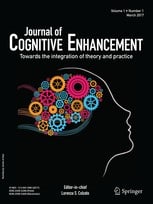
Authors: Moore, A.L., Carpenter, D.M., Miller, T.M., & Ledbetter, C. (2019).
In a randomized controlled trial assessing equivalence of parallel groups of children ages 8-14, we compared cognitive outcomes between a group who received 60 hours of ThinkRx cognitive training delivered one-on-one by a clinician (n = 20) versus a group of children who received 30 hours of ThinkRx delivered by a clinician and the remaining 30 hours through supervised digital training procedures in a computer lab (n = 18). Results showed no significant differences between groups on tests of working memory, logic and reasoning, auditory processing, visual processing, processing speed, or overall IQ score. Results were significantly different on the test of long-term memory. These results suggest that both delivery models are nearly equivalent delivery methods of ThinkRx cognitive training for children. This study controlled for placebo effects because both groups attended the same number of sessions and spent the same number of hours in training (60) with an adult present. Finally, this was a single-blind study. The participants did not know there was a difference in training methods.
Clinician-Delivered Cognitive Training for Children with Attention Problems: Effects on Cognition and Behavior from the ThinkRx Randomized Controlled Trial.
Neuropsychiatric Disease and Treatment, 14, 1671-1683.
doi: 10.2147/NDT.S165418
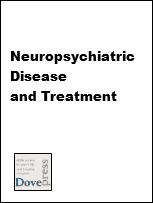
Authors: Moore, A.L., Carpenter, D.M., Ledbetter, C., & Miller, T.M. (2018).
In a randomized controlled study, we examined the effects of a one-on-one cognitive training program on memory, visual and auditory processing, processing speed, reasoning, attention, overall IQ score, and behavior for students ages 8-14 with ADHD. Results included greater pretest to post-test change scores on all variables for the treatment group versus the control group with statistically significant differences noted in working memory, long-term memory, logic and reasoning, auditory processing, and IQ score. Qualitative outcomes included far transfer to cognition and behavior as reported by participants, parents, and clinicians.
Neuroimaging Outcomes of a Cognitive Rehabilitation Training Program.
Journal of Neuroimaging, 28(2), 225-233.
doi: 10.1111/jon.12507
Authors: Ledbetter, C., & Moore, A. (2018).
To investigate if aberrant brain connectivity and changes in brain connectivity (a neuroimaging marker of neuroplasticity), were evident prior to and after completion of a robust cognitive training program, a series of case studies were carried out in subjects with varying degrees of traumatic brain injuries (n = 5) and cognitive impairment (n = 5). MR exams were acquired on all subjects prior to and upon completion of the ThinkRx cognitive training program. In addition to MR exams, all subjects completed pre-post neuropsychological testing (WJ-IV) and condition-specific rating scales. For all cases, neuropsychological testing and qualitative outcomes measures increased, supporting that the robustness of the training program held for each imaged case study. Normalization of DMN connectivity, including decreased hyperconnectivity and reoccurrence of anticorrelated activity, was evident in the most severe TBI case. At the group level, significant training-induced changes in neural connectivity were identified.
Reliability and Validity of the Revised Gibson Test of Cognitive Skills, a Computer-Based Test Battery for Assessing Cognition Across the Lifespan.
Psychology Research and Behavior Management, 11, 25-35.
doi:10.2147/PRBM.S152781
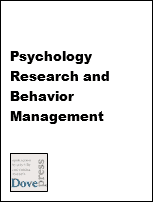
Authors: Moore, A.L., & Miller, T. (2018).
This study evaluated the validity and reliability of the revised Gibson Test of Cognitive Skills, a computer-based battery of tests measuring short-term memory, long-term memory, processing speed, logic and reasoning, visual processing, as well as auditory processing and Word Attack skills. The sample for the study included 2,737 participants ranging in age from 5 to 85. Results indicated strong sources of evidence of validity and reliability for the test, including test-retest reliability coefficients ranging from .69-.91, split-half reliability coefficients ranging from .87 to .91, and concurrent validity coefficients ranging from .53 to .93. The Gibson Test of Cognitive Skills -2 is a reliable and valid tool for assessing cognition in the general population across the lifespan.
LearningRx Cognitive Training for Children and Adolescents Ages 5-18: Effects on Academic Skills, Behavior, and Cognition.
Frontiers in Education, 2(62).
doi: 10.3389/feduc.2017.00062

Author: Jedlicka, E. (2017)
This study with 178 students ages 5-18 investigated whether ThinkRx and ReadRx clinician-delivered cognitive training programs reduced academic difficulties and oppositional behavior for school-age children with learning struggles compared to a control group. Results indicated there were statistically significant differences overall between the intervention groups and the control group on all measures of academic difficulties. Both intervention groups saw a reduction in academic difficulty ratings following training while the control group saw an increase in academic difficulty during a comparable time interval. Both intervention groups achieved statistically significant changes in objective cognitive test measures as well.
Cognitive Effects of ThinkRx Cognitive Rehabilitation Training for Eleven Soldiers with Brain Injury: A Retrospective Chart Review.
Frontiers in Psychology, 8(825).
doi: 10.3389/fpsyg.2017.00825
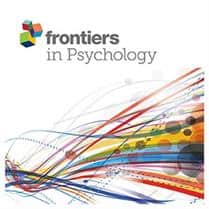
Authors: Ledbetter, C., Moore, A.L., Mitchell, T. (2017).
The current study examined the cognitive outcomes following ThinkRx, a clinician-delivered cognitive rehabilitation training program for soldiers recovering from traumatic brain injury (TBI) and acquired brain injury (ABI). In a retrospective chart review, we examined cognitive outcomes of 11 cases who had completed an average of 80 hours of ThinkRx cognitive rehabilitation training delivered by clinicians and supplemented with digital training exercises. Outcome measures included scores from six cognitive skill batteries on the Woodcock-Johnson – III Tests of Cognitive Abilities. Participants achieved gains in all cognitive skills tested and achieved statistically significant changes in long-term memory, processing speed, auditory processing, and fluid reasoning with very large effect sizes. Clinically significant changes in multiple cognitive skills were also noted across cases.
LearningRx Cognitive Training Effects in Children Ages 8-14: A Randomized Controlled Study.
Applied Cognitive Psychology, 30(5), 815-826.
doi: 10.1002/acp.3257
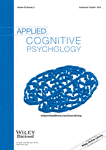
Authors: Carpenter, D., Ledbetter, C., & Moore, A.L. (2016).
In a randomized controlled study, the effects of a one-on-one cognitive training program on IQ, memory, visual and auditory processing, processing speed, reasoning, and attention for students ages 8-14 were examined. Participants were randomly assigned to either an experimental group to complete 60 hours of cognitive training or to a wait-list control group. The purpose of the study was to examine changes in general intelligence and individual cognitive skills after completing cognitive training with ThinkRx, a LearningRx program. Results showed statistically significant differences between groups on all outcome measures except for attention. Implications, limitations, and suggestions for future research are examined.
The Efficacy of the LearningRx Cognitive Training Program: Modality and Transfer Effects.
Journal of Experimental Education: Learning, Instruction, and Cognition, 84(3), 600-620.
doi: 10.1080/00220973.2015.1065218.

Authors: Hill, O.W., Zewelanji, S., & Faison, O. (2016).
This article describes two trials testing the efficacy of the LearningRx one-on-one cognitive training program and its computer-based version (Brainskills) in laboratory and school settings. Study 1 tested Brainskills in a laboratory setting with 322 middle school students. Paired t-tests revealed significant gains on all cognitive measures and math performance after 3 weeks of training. Study 2, a randomized control study, included 225 high school students randomly assigned to one of three conditions: LearningRx, Brainskills, or study hall (control) in a school setting for a 15-week training period. Univariate ANCOVAs revealed significantly higher scores for the treatment groups compared with controls on working memory, logic and reasoning, and three of four math attitude measures.
Training the Brain to Learn: Beyond Vision Therapy.
Vision Development and Rehabilitation, 1(2), 120-129.
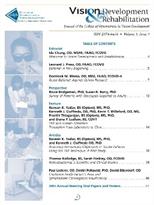
Authors: Gibson, K., Carpenter, D.M., Moore, A.L., & Mitchell, T. (2015).
The purpose of this study was to investigate the effectiveness of the comprehensive cognitive training program, ThinkRx. Sixty-one children (ages 6-18) were given pretest and post-test cognitive assessments. Thirty-one students completed a 24-week cognitive training program in a LearningRx center. A matched control group of thirty children did not receive training. Multiple regression analyses indicated that treatment group membership was a statistically significant predictor of outcomes in long-term memory, logic and reasoning, working memory, processing speed, auditory processing, and Word Attack. The treatment group realized significantly greater gains in six of seven cognitive measures.
Scientific Conference Presentations
Test-Retest, Internal Consistency, and Split-Half Reliabilities of the Gibson Assessment of Cognitive Skills, a Brief Tool for Screening Cognitive Function Across the Lifespan.
Presented at Society for Neuroscience Global Connectome Conference, January 11, 2021.
Authors: Ledbetter, C., and Moore, A.L.
Researchers examined reliability of the Gibson Assessment of Cognitive Skills (GACS), a paper-based, brief cognitive screening tool for children and adults measuring working memory, processing speed, visual processing, fluid reasoning, and three auditory processing constructs: sound blending, sound segmenting, sound deletion along with work attack skills. The sample (n = 103) for the current study consisted of children (n = 73) and adults (n = 30) between the ages of 6 and 80 (M = 20.2, SD = 17.7), 47.6% female, and 52.4% male. Overall coefficient alphas range from .80 to .94. The split-half reliability coefficients ranged from .83 to .96 overall. Across all ages, the test-retest reliability coefficients ranged from .83 to .98. The evidence collected suggests that the GACS is an accessible and reliable brief screening tool for assessing cognitive skill performance across the lifespan.
Cognitive Profiles in Dyslexia: Beyond Phonological Processing Deficits.
Presented at American Psychological Association, Presidential Poster Session, August 6, 2020.
Authors: Moore, A.L., Miller, T., & Ledbetter, C.
Researchers examined the cognitive profiles of a large sample of children with dyslexia or specific learning disability in reading (n = 4,150). Using descriptive statistics, linear regression, and independent samples t tests, we generated overall cognitive profiles and examined differences by age and sex. Overall, long-term memory, working memory, and processing speed were the most deficient cognitive skills, followed by auditory processing (phonological awareness). Age was a significant predictor of 4 of the 7 skills (p < .001) with very small effect sizes: VP, PS, AT, and AP. There was a significant difference between males and females on 4 of the 7 skills (p<.001) with very small effect sizes: VP, PS, AT, and AP. Females scored higher on all constructs except VP. Results revealed marked decline across constructs with age in the absence of an effective intervention, suggesting that interventions for children with dyslexia and specific learning disability in reading should begin early and be aimed at not only the remediation of the typically targeted phonological processing deficits but also at enhancing working memory, long-term memory, and processing speed.
The Promise of Clinician-Delivered Cognitive Training for Mild Cognitive Impairment (MCI).
Presented at Global Virtual Conference on Alzheimer’s and Dementia, June 30, 2020.
Authors: Moore, A.L., James, R., Miller, T., Moore, J.J., & Ledbetter, C.
Cognitive training delivered face to face by a clinician has the potential to slow the progression of cognitive decline in patients with mild cognitive impairment (MCI) and subjective cognitive decline (SCD). We examined this potential in two studies using an intense, metronome-paced multicomponent cognitive training intervention originally created for children designed to remediate multiple cognitive skills including working memory, long-term memory, processing speed, fluid reasoning, visual and auditory processing, and attention. In the first study, we compared two methods of delivering 80 hours of training to 292 participants ranging in age from 51 to 95 with subjective memory or attention complaints. Both delivery methods resulted in significant gains across all cognitive skills, as well as transfer to improvements in mood, memory, cognitive efficiency, life application skills, and attention. In the second study, we examined cognitive training as part of a Functional Medicine intervention with physical exercise, anti-inflammatory diet and nutritional supplements, sleep optimization, and stress management for five cognitively impaired patients over age 50. Following the intervention, three of the five patients were no longer classified as cognitively impaired, a fourth patient improved to only mildly impaired, and the most severely impaired patient remained steady. Patients reported improved memory, mental clarity, and outlook on life. fMRI analyses revealed changes in brain connectivity and efficiency. Both studies support the potential of face-to-face cognitive training for MCI and SCD in patients over age 50 as a standalone intervention or as part of a holistic approach to slowing cognitive decline in this population.
MRI and Neuropsychological Outcomes of Cognitive Rehabilitation Training for Repetitive Sports Concussion.
Archives of Physical Medicine and Rehabilitation, 100(10), e100. doi.org/10.1016/j.apmr.2019.08.288
Authors: Ledbetter, C., Moore, A.L., Miller, T.M., & Taylor, M. (2019).
Using an interventional single case study pre-post trial design, cognitive and neuroimaging changes following 60 hours of ThinkRx training were evaluated in a student-athlete with repetitive concussions and post-concussion syndrome. After training, fMRI showed a dramatic normalization of the Default Mode Network with increased connectivity between the right parietal node and the medial prefrontal cortex. Full scale IQ score improved along with gains in all individual skills, including large jumps in logic and reasoning, working memory, and long-term memory. Overall executive function score improved by 30 points. After training, the patient returned to school, was able to actively participate in conversations again, reported that ‘brain fog’ had lifted, and had a hopeful outlook for his future.
Key Ingredients of Effective Cognitive Rehabilitation Training. Proceedings of the 5th Neurological Disorders.
Summit in Journal of Neurology & Experimental Neuroscience.
doi: 10.17756/jnen.2019-suppl1
Authors: Moore, A.L., & Ledbetter, C. (2019).
Much more than brain games, effective clinician-delivered cognitive rehabilitation training can remediate learning struggles, recover cognitive functioning following traumatic brain injury, increase self-esteem and confidence, and improve quality of life across the lifespan. The human interaction in effective cognitive training is grounded in Feuerstein’s theory of structural cognitive modifiability, or the potential of an individual’s cognition AND synaptic strength to be changed by mediated experience. This interactionist approach to a cognitive intervention aligns with the therapeutic perspective. In this workshop, we present seven elements to make cognitive rehabilitation training more effective: repetitively practiced, delivered by a clinician (not a computer), intense, targeted, sequenced, progressively loaded, and with dynamic feedback. These elements have been critical components of the cognitive rehabilitation intervention the presenters use and in the studies they have published and presented on the efficacy of the intervention.
Neuropsychological Assessment Outcomes Following Cognitive Rehabilitation Training for Children and Adults with Traumatic Brain Injury.
Presented at Society for Neuroscience, November 2018, San Diego, CA.
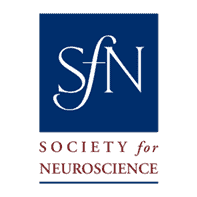
Authors: Moore, A.L., Ledbetter, C., & Carpenter, D. (2018).
Using a quasi-experimental design, this study examined differences between children and adults in neuropsychological and functional outcomes following 95 hours of LearningRx training with 329 clients post-TBI. Clients attended three 90-minute training sessions per week for an average of 95 hours over 6-9 months. MANOVA revealed no significant differences between children and adults on any variable. All changes from pretest to post-test within groups were significant. Transfer to real life benefits was achievement for both age groups, including improved work or academic performance, greater self-discipline, increase confidence, improved social skills, better driving, and improved focus, memory, and processing speed.
MRI and Neuropsychological Outcomes Following a Functional Medicine Intervention with Cognitive Training in Mild Cognitive Impairment (MCI): A Multiple Case Study.
Presentation at American Psychological Association Annual Convention, August 2018, San Francisco, CA.
Authors: Moore, A.L., James, R., Carpenter, D., Miller, T., & Ledbetter, C. (2018).
Using a multiple case study design, we examined neural connectivity with fMRI, executive function, memory, attention, reasoning, everyday functioning, and overall IQ score for 5 clients with varying levels of Mild Cognitive Impairment (MCI) before the intervention, after 12 weeks on functional medicine (FM) protocols (grain-free/sugar-free diet, nutritional supplements, aerobic activity, optimized sleep & stress reduction) without cognitive training, and again following the addition and completion of 72 hours of cognitive training. In all five cases, improvement in both cognitive and life skills was achieved with a functional medicine protocol that included cognitive training. Normalization of the Default Mode Network (DMN) was evident along with the appearance of anti-correlations and decreased hyperconnectivity. A multidisciplinary approach to slowing or reversing cognitive decline appears to be promising.
MRI, qEEG, and Neuropsychological Outcomes Following Cognitive Rehabilitation Training for Severe Traumatic Brain Injury: A Clinical Case Study.
Presentation at Brain Injury Summit, Jan 2018, Vail, CO.
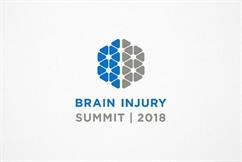
Authors: Moore, A.L., & Ledbetter, C. (2018).
Using a single case design, we examined neural connectivity changes with fMRI, qEEG, and changes in IQ score, working memory, long-term memory, visual & auditory processing, processing speed, attention, reasoning, and everyday functioning following 60 hours of cognitive training 8 years after a severe Traumatic Brain Injury. Neuropsychological testing results showed a 21-point increase in IQ score and significant gains in working memory, processing speed, logic and reasoning, and visual processing; as well as gains in long-term memory and auditory processing. FMRI showed normalization of the Default Mode Network (DMN) with the reappearance of anti-correlations and decreased hyperconnectivity was evident post-training. Post qEEG showed normalization of activity in the left frontal region which was previously abnormal. Functional outcomes included improved motivation for life, better focus and problem-solving, improved mood, no deficits in daily living tasks, and a return to former high-level career field.
MRI and Neuropsychological Outcomes Following Cognitive Rehabilitation Training in Traumatic Brain Injury: A Multiple Case Study.
Presented at Society for Neuroscience, November 2017, Washington, DC.
Authors: Moore, A.L., Ledbetter, C., & Carpenter, D. (2017).
Using a multiple case study design, we examined neural connectivity changes with fMRI and changes in IQ score, working memory, long-term memory, visual and auditory processing, processing speed, attention, reasoning, and everyday functioning following 60 hours of cognitive training for 5 clients with Traumatic Brain Injury. Results from the Woodcock-Johnson IV -Tests of Cognitive Abilities showed increases in IQ score for all cases (n = 5), with a mean increase of 21 points. All cases achieved gains in long-term memory, processing speed, logic and reasoning, and auditory processing; and four of five cases gained on visual processing and working memory. mTBI participants exhibited significant training-induced changes in neural connectivity. Normalization of the Default Mode Network (DMN) was evident in the severe TBI case along with the appearance of anti-correlations and decreased hyperconnectivity.
Beyond Attention: Memory and Processing Speed Deficits Dominate Cognitive Profiles in ADHD Across the Lifespan.
Presented at American Psychological Association Annual Convention, August 2017, Washington, DC.
Authors: Moore, A.L., & Ledbetter, C. (2017).
The objective of this study was to examine the cognitive profiles of a large sample of children and adults with Attention Deficit Hyperactivity Disorder (n = 5,417). We collected scores on the Woodcock-Johnson III – Tests of Cognitive Abilities administered to children and adults with ADHD at 79 cognitive therapy centers between 2010 and 2015. Deficits were identified in comparison to the standardization sample as standard scores under the 38th percentile. Results indicated that although deficits in broad attention were present, there were even larger deficits in working memory, long-term memory, and processing speed. The results suggest that interventions for children and adults with ADHD should be aimed at not only the remediation of attentional difficulties but also at enhancing memory and processing speed.
Correlation of Cognitive Training Gains and Resting State Functional Connectivity.
Presented at Society for Neuroscience, November 2016, San Diego, CA.
Authors: Ledbetter, C., Faison, M.O., & Patterson, J. (2016).
In a randomized controlled trial, 30 high school students were randomly assigned to ThinkRx cognitive training (n = 11), Brainskills digital training (n = 12), or a control group (n = 7). Resting state MRI results showed training-induced gains in global efficiency associated with visual processing, auditory processing, contextual associations, the default mode network, and the cerebellum. For all seven cognitive skills measured, changes in resting-state functional connections correlated with changes in performance on the test.
Intensive, Metronome-Based, 1-On-1 Cognitive Training Improves Cognitive Skills in Children.
Presented at Society for Neuroscience, November 2016, San Diego, CA.
Authors: Moore, A.L., Ledbetter, C., & Carpenter, D.M. (2016).
In a 2-phase randomized controlled trial, we examined the efficacy of ThinkRx cognitive training on IQ score, working memory, long-term memory, visual & auditory processing, processing speed, and reasoning for children ages 8-14 in a clinic setting. Then, we examined the differences between two methods of delivering ThinkRx. Phase 1 training effects included significant pretest to post-test gains on all measures and a mean gain of 21 points in IQ scores for the trained group. Phase 2 training effects included significant pretest to post-test gains on all measures and a mean gain of 22 points in IQ score for the second trained group. Pairwise comparisons only indicated a significant difference between the two delivery methods on long-term memory.
Dissertations & Technical Reports
Examining the Self-Efficacy Perceptions of Adults Who Completed a ThinkRx One-On-One Brain Training Program.
Author: Highland, S. A. (2019).
The purpose of this qualitative study was to examine the perceptions of adults who completed a LearningRx ThinkRx program. Three forms of data were collected: artifact data, participant interviews, and member checking interviews. Using a thematic data analysis, five themes found in this study were self-awareness, problem solving, emotional control, achievement, and leadership. There was direct support for the research question from the themes of self-awareness, problem solving, and emotional control.
Stanford, D. R. (2022). The Effectiveness of Cognitive Training on Cognitive Skills in Children Ages 5 to 7-years Old. Doctoral dissertation.
The purpose of this casual-comparative study was to explore the effectiveness of the LiftOff one-on-one cognitive training program on early childhood children ages 5 to 7. The data were collected from 5 to 7-year old children who completed a LiftOff cognitive training program through LearningRx between 2010 and 2019 (n =1,067). Statistical analyses of Woodcock Johnson pre/post test scores show statistically significant differences between pre-test and post-test on working memory, processing speed, visual processing, auditory processing, and logic and reasoning with medium to very large effect sizes.
Achievement Outcomes for LearningRx Students: Math and Reading Achievement Before and After Cognitive Training.
Author: Moore, A. (2015).
This study analyzed reading and math achievement outcomes for more than 6,000 students who completed a ReadRx or MathRx training program at LearningRx between 2008 and 2014. To assess differential effects of each program and to control for placebo effects, the ReadRx students served as the control group for the MathRx program and the MathRx clients served as the control group for the ReadRx program. We measured the opposite skills from which the clients were trained. The MathRx clients made twice the gains in math and the ReadRx clients made twice the gains in reading. In a subset of clients who provided state reading achievement test results, 91% percent of the clients who completed the ReadRx program showed improvement in state reading achievement tests after the intervention.
The Real-Life Benefits Of Cognitive Training.
Author: Jedlicka, E. (2012).
Dr. Edward Jedlicka used an observational survey completed by parents to evaluate whether LearningRx brain training produced noticeable, real-life improvements in their children, especially in the areas of cognitive skills, academic success, and oppositional behavior. Associated manuscript was published in 2017.
Cognitive Training in a School Curriculum: A Qualitative Single Instrument Case Study.
Author: Musick, S.. (2015).
Dr. Stuart Musick examined practical, effective applications of implementing a cognitive training curriculum into a high school curriculum with the intent of helping all clients be successful. As a follow-up to a randomized controlled trial, Dr. Musick interviewed researchers, teachers, trainers, and participants about their experiences. He concluded that teachers should be trained to integrate cognitive training exercises into their curriculum.
Cognitive Trainer Characteristics That Predict Outcomes for Students with and Without ADHD.
Author: Moore, A. (2015).
Dr. Amy Moore studied characteristics of 150 cognitive trainers that predicted outcomes for 1,195 clients with and without ADHD. After examining the predictive value of trainer personality, degree level, degree field, certification level, and pre-hire cognitive screening score on client gains in long-term memory, working memory, processing speed, and general intelligence, she found that no trainer profile held practical significance. Dr. Moore concluded that the intervention itself may be more important than the characteristics of the person delivering it.
The Effect of Cognitive Rehabilitation Therapy on Memory and Processing Speed in Adolescents.
Author: Pfister, B. (2012).
Before and after scores of 1,277 adolescents were evaluated by Brian E. Pfister to determine whether LearningRx brain training improved working memory and processing speed.
Doctoral Dissertation Examines Impact of One-on-One Brain Training on Intelligence and Academics
Author: Luckey, A.
Dr. Alicia Luckey studied the impact of LearningRx brain training on GIA, memory, and reading in clients with ADHD, clients with dyslexia, and clients who were not reported to have any type of disability.
Doctoral Dissertation Examines the Effects of LearningRx on Memory in Adults with Traumatic Brain Injury
Author: Ishanpara, P.
Dr. Poonam Ishanpara analyzed the pre-test and post-test scores of 39 adults with traumatic brain injury (TBI). Her results indicated statistically significant differences in long-term memory, short-term memory, and working memory after LearningRx training.
LearningRx Training and IQ Gains.
Author: Moore, A. (2015).
This presentation reports the changes in IQ from before and after LearningRx training of more than 18,000 clients between 2008 and 2015. The average IQ before training was 97 and the average IQ after training was 111, resulting in an average IQ gain of 14 points. The presentation also reports on a subset of 40 students with double baseline testing, revealing a decline in IQ between the time of diagnosis and beginning LearningRx training and then a dramatic increase in IQ following LearningRx training.
Effectiveness of LearningRx Among Students in the Lowest Quartile.
Author: Luckey, A.
Doctoral Student Alicia J. Luckey, M.A., Educational Psychology, Arizona State University, examined the effect of LearningRx training on 2,080 clients who completed programs in 2006. She focused on clients whose before-training scores fell in the lowest 25%.
Independent Analysis of Test Results from 1,265 LearningRx Clients.
Author: Mariachi, R. (2006).
Roxana Marachi, P.D., Assistant Professor, Department of Child & Adolescent Development at California State University, Northridge, analyzed the pre-training and post-training scores of 1,265 LearningRx clients who participated in the program in 2005.
Some of the statistics on this page are based on the average pre- and post-test results of thousands of clients, without a control group. You may see more or less improvement in IQ and/or cognitive skills following your program.








